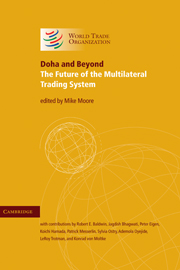Book contents
- Frontmatter
- Contents
- List of contributors
- Introduction
- 1 Trade and sustainable development in the Doha Round
- 2 The WTO: the institutional contradictions
- 3 China's entry into the WTO and its impact on the global economic system
- 4 Key challenges facing the WTO
- 5 Development dimensions in multilateral trade negotiations
- 6 External transparency: the policy process at the national level of the two-level game
- 7 Trading for development: how to assist poor countries
- 8 Controlling corruption: a key to development-oriented trade
- 9 The impact of EC enlargement on the WTO
- Index
8 - Controlling corruption: a key to development-oriented trade
Published online by Cambridge University Press: 05 August 2012
- Frontmatter
- Contents
- List of contributors
- Introduction
- 1 Trade and sustainable development in the Doha Round
- 2 The WTO: the institutional contradictions
- 3 China's entry into the WTO and its impact on the global economic system
- 4 Key challenges facing the WTO
- 5 Development dimensions in multilateral trade negotiations
- 6 External transparency: the policy process at the national level of the two-level game
- 7 Trading for development: how to assist poor countries
- 8 Controlling corruption: a key to development-oriented trade
- 9 The impact of EC enlargement on the WTO
- Index
Summary
Introduction
The mission of the World Trade Organization (WTO) rests on the credo that barriers to trade are barriers to development. I share this belief. And yet, like other civil society organizations worldwide, Transparency International (TI) is intensely concerned about the WTO's single-minded concentration on the removal of trade barriers and its lack of attention to the development-obstructing phenomena that can accompany trade liberalization.
Unchecked global market forces can lead to exploitation, deepen poverty and fuel conflict. Strong, responsive governments, able to play an effective role in preventing or at least correcting such undesired globalization outcomes, are essential if trade liberalization is to foster sustainable development. For this reason, TI is particularly concerned about the unrestrained spread of cross-border trade corruption. Its corrosive effects on the integrity of governments vastly weaken the correlation between global trade expansion and societal well being. TI therefore strongly urges the WTO to recognize the fight against cross-border corruption as one of its major and immediate responsibilities.
The explicit purpose for which the WTO was founded was to liberalize trade worldwide, but the maximizing of global trade is not an end in itself. Even the most staunch proponent of neo-liberal economics would be loath to quarrel with the claim that the goal of trade liberalization is to contribute towards economic and concomitant human development. Yet while the WTO has certainly succeeded in stimulating the volume of international trade, the promise of increased, equitably distributed welfare gains for all world trade participants remains distressingly unfulfilled.
- Type
- Chapter
- Information
- Doha and BeyondThe Future of the Multilateral Trading System, pp. 125 - 145Publisher: Cambridge University PressPrint publication year: 2004

